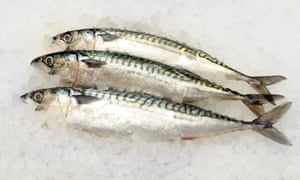Lucy Campbell

Fatty fish such as mackerel are naturally rich in vitamin D. Photograph: Matthew Horwood/Alamy Stock Photo
Supplements
From April to September, most Britons produce all the vitamin D they need in their own bodies, as sunlight strikes their skin when they are outdoors. Levels drop significantly once summer ends. “It’s not having high levels of vitamin D that matters – it’s avoiding being deficient,” says Julia Newton-Bishop, professor of dermatology at the University of Leeds. The scientific advisory committee on nutrition recommends that everyone living in the UK should consider taking a moderate daily dose of vitamin D, which helps to keep your bones, teeth and muscles healthy. For people of relative good health, that is 10 micrograms. “For people with darker skin pigmentation, it’s generally harder to make the same amount of vitamin D from sunlight, so taking a daily supplement year-round should be considered,” says Martin Hewison, professor of molecular endocrinology at the University of Birmingham. “You can either take a dedicated vitamin D supplement, or a multivitamin capsule, which will usually have a low level close to what the government advises. Eating certain foods can also partially address vitamin D deficiency – but it’s not enough on its own.”
Mushrooms
“The skin of mushrooms has the ability to make vitamin D when sunlight hits it, just like human and animal skin,” says Hewison. “Leaving mushrooms outside where they are exposed to sunlight (if they are inside, window glass will block UVB rays that are used to make vitamin D) means they become vitamin D-enriched. Some mushrooms can now also be bought enriched.”
Oily fish
Few foods are naturally rich in vitamin D and the levels provided can be hit and miss. “Fatty fish such as mackerel, herring and salmon is the best option in moderate portions each week,” says Newton-Bishop. “Salmon in the wild get vitamin D from the plankton they eat, so wild Atlantic salmon, for example, will be rich in it, whereas farmed salmon may not have very much at all. Of course the other problem with fish is that it doesn’t appeal to vegetarians and vegans. In that case, the only natural source is mushrooms.”
Fortified foods
Fewer foods are enriched with vitamin D in the UK than in, say, the US, says Newton-Bishop. “So you have to rely more on naturally rich foods. However, some breakfast cereals are fortified with vitamin D, and it is also added to some yoghurts.” Researchers from the University of Birmingham found that a national policy of fortifying certain foods such as wheat flour could sufficiently address vitamin D deficiency.
Cod liver oil
“Along with the other benefits of omega and fatty acids, one tablespoon of cod liver oil provides far more than the government’s recommended daily intake, so that’s another alternative to taking a dedicated supplement,” says Hewison.